Newsweek|Opinion Published May 10, 2024
By Alex Galitsky and Gev IskajyanArmenian National Committee of America (ANCA)’s Policy Director; ANCA’s National Grassroots Director
Last month, the Armenian government announced plans to surrender territory in the northern Armenian region of Tavush as part of a border delimitation process with Azerbaijan, sparking demonstrations over a decision many fear would irreparably undermine Armenia’s security and embolden Baku’s efforts to impose its demands on Armenia at the barrel of a gun. Following weeks of demonstrations—met with brutal police crackdowns—over 100,000 people recently descended on the capital city of Yerevan, led by Archbishop of Tavush Bagrat Galstanyan, to demand the resignation of Armenian Prime Minister Nikol Pashinyan.
The mass movement in Armenia has not only revealed a deep disaffection with a government many hold responsible for failing to prevent Azerbaijan’s assault on Nagorno-Karabakh in 2020, and the subsequent ethnic cleansing of the region’s entire Armenian population last year. It also reveals growing skepticism toward an inequitable peace process that has forced Armenia to make unbearable concessions while providing no guarantees for Armenia’s security amid Azerbaijan’s routine cross-border attacks and ongoing occupation of sovereign Armenian territory.
Growing discontent in Armenia over peace talks has put the U.S. and European Union in an awkward position. Long dependent on Moscow for its security, Armenia has been looking for new partners following Russia’s failure to meet its allied obligations in the face of Azerbaijan’s aggression. The West, in turn, has been eager to capitalize on this geopolitical vacuum—seeking to clinch a long-elusive peace deal between Armenia and Azerbaijan that would see it supplant Russia’s influence in the region, open a new front in the containment of Iran, and ensure the uninterrupted flow of oil and gas from Azerbaijan to Europe.
In spite of the renewed vigor of U.S. diplomatic efforts, Azerbaijan has repeatedly proven unwilling to engage seriously in peace talks—rejecting high-level meetings with senior U.S. officials, refusing to participate in proposed negotiations, and openly rejecting the West’s mediation.
Despite this, Washington hasn’t changed course. The misplaced belief that Azerbaijan has a role in supporting U.S. regional security interests has seen the U.S. lavish Azerbaijan with military assistance and lucrative defense contracts for decades. This misguided policy of appeasing Azerbaijan continues to inform Washington’s refusal to impose tangible costs on Baku for its ethnic cleansing of Nagorno-Karabakh—such as prohibiting security aid to and imposing Global Magnitsky sanctions on Azerbaijani officials responsible for war crimes. Having faced no repercussions for its genocidal aggression, Azerbaijan has no incentive to come to the table in good faith and sees more to gain through force than through negotiations.
This Faustian bargain with Azerbaijan hasn’t even yielded clear results for the U.S. Ironically, in its attempts to contain Russia and Iran’s influence in the region, Washington has empowered a regime that has consistently been rated as less free than both—one that has served as an energy conduit for Moscow to evade Western sanctions.
Not only has the West failed to hold Azerbaijan accountable—but in the wake of its ethnic cleansing of Nagorno-Karabakh, it has rewarded Baku through the expansion of energy deals, billions in economic investment, and new military partnerships with European countries. Azerbaijan was also recently granted the privilege of hosting COP29, after compelling Armenia to drop its veto through hostage diplomacy. Not only has this made a mockery of the U.N.’s premier climate summit—it has contributed to greenwashing the country’s egregious environmental record and the central role the energy sector has played in fueling the consolidation of Azerbaijan’s authoritarian regime.
Concerns over the direction of peace talks were only compounded by a recent diplomatic blunder by the U.S. when Ambassador to Azerbaijan Mark Libby visited the ethnically cleansed town of Shushi—where it was recently revealed that Azerbaijan had destroyed yet another Armenian church and cemetery. The visit came just days after the ambassador, when pressed on whether he would visit the city, stated that he would not “play a part in a propaganda show”—underscoring Washington’s inability and unwillingness to hold Azerbaijan accountable, and undermining trust in U.S. diplomacy in the region.
Washington needs to understand that it cannot have its cake and eat it too in the South Caucasus. It cannot proclaim to support Armenia’s sovereignty while simultaneously enabling Azerbaijan through impunity amid its unabated threats of war against Armenia. Nor can it claim to support democracy and human rights in the region while refusing to hold Azerbaijan’s authoritarian regime accountable for war crimes and ethnic cleansing.
As demonstrations against unilateral territorial concessions in Armenia gather steam, the U.S. must reconcile with the fact that a just and durable peace is not possible in the absence of accountability. By failing to resolve this inherent contradiction in its foreign policy toward the region, the U.S. not only risks squandering a crucial opportunity to diversify Armenia’s partnerships and support its engagement with the West—it threatens to legitimize the very authoritarian expansionism it has ostensibly sought to confront elsewhere in the world.
Alex Galitsky is policy director of the Armenian National Committee of America (ANCA), the largest Armenian American grassroots advocacy organization in the United States.
Gev Iskajyan served as executive director of ANC-Artsakh during the blockade and ethnic cleansing of Nagorno-Karabakh based in Stepanakert and is currently the ANCA’s National Grassroots Director.




